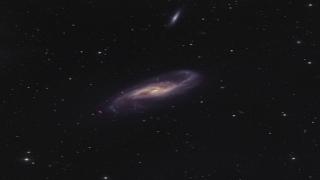Bibcode
Mazzuca, Lisa M.; Swaters, Robert A.; Knapen, J. H.; Veilleux, Sylvain
Referencia bibliográfica
The Astrophysical Journal, Volume 739, Issue 2, article id. 104 (2011).
Fecha de publicación:
10
2011
Revista
Número de citas
24
Número de citas referidas
19
Descripción
We combine DensePak integral field unit and TAURUS Fabry-Perot
observations of 13 nuclear rings to show an interconnection between the
kinematic properties of the rings and their resonant origin. The nuclear
rings have regular and symmetric kinematics, and lack strong
non-circular motions. This symmetry, coupled with a direct relationship
between the position angles and ellipticities of the rings and those of
their host galaxies, indicates that the rings are in the same plane as
the disk and are circular. From the rotation curves derived, we have
estimated the compactness (v 2/r) up to the turnover radius,
which is where the nuclear rings reside. We find that there is evidence
of a correlation between compactness and ring width and size. Radially
wide rings are less compact, and thus have lower mass concentration. The
compactness increases as the ring width decreases. We also find that the
nuclear ring size is dependent on the bar strength, with weaker bars
allowing rings of any size to form.
Proyectos relacionados

Las Galaxias Espirales: Evolución y Consecuencias
Nuestro grupo pequeño esta bien conocido y respetado internacionalmente por nuestro trabajo inovativo e importante en varios aspectos de la estructura y la evolución de las galaxias espirales cercanas. Usamos principalmente observaciones en varias longitudes de onda, explotando las sinergías que nos permiten responder a las cuestiones más
Johan Hendrik
Knapen Koelstra